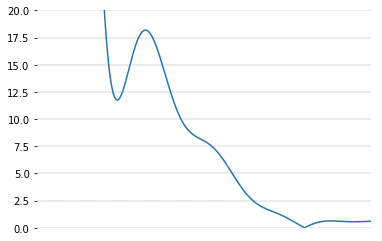It is not so easy to write down a function that satisfies your requirements and has an explicit formula for its Fourier transform. Luckily, an explicit form is not necessary:
Let $f$ be any function which is as specified in the question. Assume w.l.o.g. $\hat f(0) = 1$ and $0$ a global maximum of $|\hat f|$.
Otherwise we can modulate and rescale $f$ to end up in this situation. Consider the function
$g_a(x) := f(x) - f(x/a)/(2a)$. Note that $f, g_a$ are continuous and $\hat g_a= \hat f - \hat f(a x)/ 2$. Claim: $|\hat g_a|$ has a local minimum in a neighborhood of $0$ for some $a > 0$.
Since $0$ is a global maximum of $|\hat f|$, there is a neighborhood $U$ of $0$ such that $|\hat g_a|>1/4$ for all $a>0$ and $|\hat f|>3/4$.
We clearly have that $|\hat g_a(0)| = 1/2$ for all $a>0$. Moreover, for $a \to \infty$ we see that $\hat g_a$ converges pointwise to $\hat f$ on $\mathbb R\setminus \{0\}$ and to $1/2$ on $\{0\}$.
Thus, for sufficiently large $a$ we see that there are two points $x_1< 0 < x_2$ in $U$ such that $|\hat g_a(x_i)|>1/2 = |\hat g_a(0)|$ for $i = 1,2$. Thus $|\hat g_a|$ has a local minimum between $x_1$ and $x_2$ which is not a root of $\hat g_a$.

